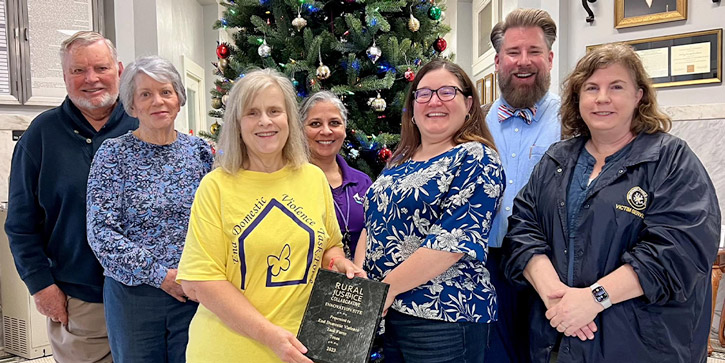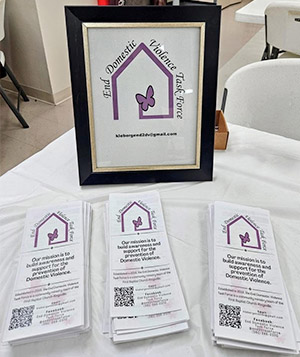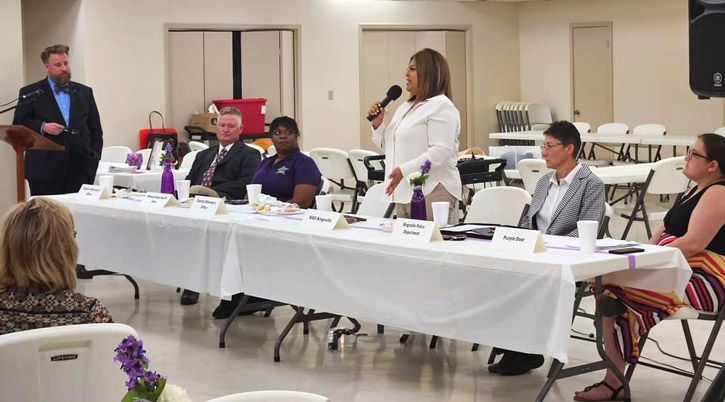Aug 14, 2024
Ending Domestic Violence: How A Rural Texas Town Built a Support Net for Victims

To anyone watching through the restaurant window, J. Dean Craig was just eating lunch like he normally did.
Craig, an Assistant County Attorney in Kleberg County, Texas, had sat down at one of his usual lunch spots in Kingsville when one of his favorite waitresses approached the table.
"She said, 'Mr. Craig, I know what you do for a living,'" Craig recalled. "'Here's the issue I'm having.' And we had a talk."
The issue, Craig learned during their talk, was that the woman was trapped in an abusive marriage. She needed help leaving the relationship. And so there in the restaurant, Craig gave her information about her options — about local organizations and resources — and helped her plan her next steps. Over the coming days and weeks, Craig and other community partners would put the woman in touch with the local shelter, help her to get to a safe location, connect her with a divorce attorney, and placate her husband after he called the police to report her missing.
Outside the restaurant, the woman's husband passed by repeatedly, watching the interaction unfold through the storefront window. But to him or any other passerby, nothing about the scene — a waitress chatting with one of her usual customers — would have looked out of the ordinary.
"If he had seen her talking to anyone [about her marriage], that would have been a problem," Craig explained. "But if she was talking to a customer, that was okay. At that point, I wasn't even an attorney giving her information — I was just a regular person who knew about resources to get her out of the situation."
Equipping "regular people" with the information and resources to help community members who are experiencing domestic violence is one of the primary goals of the Kingsville End Domestic Violence Task Force, an initiative launched in early 2019. The initiative, which includes hotel voucher, court accompaniment, public awareness education, and "Trusted Partner, Trusted Location" programs, fills gaps in support for local abuse survivors while building on existing community resources.
We are not immune [from domestic violence] being in a small Texas town.
"We are not immune [from domestic violence] being in a small Texas town," said Kathy Kimball, who serves as President of the task force.
Enhanced Support
While data shows that intimate partner violence is similarly prevalent in both urban and rural areas, rates of emergency department visits due to abuse tend to be higher in rural areas — perhaps, experts suggest, because rural survivors tend to have fewer resources available to them to prevent or escape an abusive situation before the violence escalates to the level of requiring hospitalization (report no longer available online). In some cases, violence escalates beyond hospitalization: homicide due to intimate partner violence is also more prevalent in rural areas, studies have shown.
The seeds of the End Domestic Violence Task Force were sown in late 2018, when pastors in the Kingsville Ministerial Alliance realized that there were gaps in services and a lack of support for agencies working with victims of abuse. The nearest shelter, operated by regional domestic violence organization The Purple Door, was fifty miles from Kingsville — a distance that proved prohibitive for people without transportation, or whose jobs or school-aged children required them to stay closer to home. As a result, police officers were pooling their own money to place victims in local hotels for their safety. To address this and other challenges, local agencies including The Purple Door, law enforcement, and the county attorney's office came together to form the End Domestic Violence Task Force, a communitywide initiative that provides enhanced support for domestic violence survivors and spreads public awareness of the issue.
In 2019, the task force partnered with The Purple Door and the Kingsville Police Department to create a hotel voucher program for people in emergency domestic violence situations. Under the program, police officers can provide abuse survivors with a room at a local hotel for a night or two if they need a safe place to go.

The task force asks that anybody who utilizes the hotel voucher program then gets in touch with an advocate at the Purple Door for an explanation of available services.
"The idea is that if you stay in a hotel one night, the next day you meet with the Purple Door and come up with a safety plan," Kimball said.
Since 2019, the hotel voucher program has expanded to also work with the Kleberg County Sheriff's Office and Texas A&M–Kingsville's University Police Department, along with several other law enforcement agencies in neighboring counties.
That same year, the task force launched a court accompaniment program for domestic violence survivors. Any person who opts into the court accompaniment program can have a group of task force members sit behind them, on their side of the courtroom, during protective order hearings. A typical hearing will draw about half of the task force's 40 members, according to program leaders.
"We don't always need it, but it's a great resource to have," said Craig, who prosecutes all misdemeanor domestic violence cases in the county in his role as Assistant County Attorney. "It's great to have a group of folks that you don't know them, but they're here to support you."
It's great to have a group of folks that you don't know them, but they're here to support you.
The court accompaniment program can be especially useful for military spouses who have moved to Kingsville for their partner's work at the nearby Naval air station, Craig noted.
"[Military spouses] may not know anybody here and may not have a support system like they would in a larger city," Craig said. "In a military town, [the partner who is in the military] will automatically have that support system and will have a whole side of the courtroom dedicated to him."
Kimball recalls the task force's first protective order hearing under the court accompaniment program, and the surprise of the couple's young children at seeing five strangers show up at the courthouse to support them and their mother.
"After it was over, those kids came through and wanted to hug each one of us," Kimball said. "It may not always turn out right, but in this situation it did."
Educating a Community
Across Kingsville, supportive strangers can also be found in churches, hair salons, and community meeting places. An estimated 15 to 20 businesses and organizations in the community have been designated as "Trusted Locations" — places where a person experiencing domestic violence can go to confide in someone and learn about their options. To signal that they are a Trusted Location, businesses will typically display a small sticker on their door or in a more discreet location inside.
"We thought, 'How great would it be to have places to go where he's not going to be jealous or watching her — the beauty parlor, or maybe daycare, or the doctor's office — where she can go and have a conversation with somebody that has information,'" Craig said.
More than 100 Kingsville residents have also been trained as "Trusted Partners": people who, like Craig in the restaurant, can offer guidance to friends, neighbors, acquaintances, and strangers who need help.
"Our thought is, let's start training individuals so that when they're having coffee with their friend and she says something, it sends up those red flags and they can dive into the conversation a little bit differently," Kimball said. "Or if somebody comes to you and says, 'I don't know what to do,' then you know what to do."
Trusted Partners training sessions are held over the course of a morning, and include information about identifying intimate partner abuse, the legal process, and local resources available through The Purple Door. One recent training session drew about 20 people.

Since the beginning, public education and awareness has been a central component of the task force's mission. The task force held a series of educational events shortly after it formed in early 2019, and continues to hold luncheons with guest speakers and other events to raise public awareness and correct misconceptions about domestic violence. Outreach to churches and other local faith communities — who led the creation of the task force through the Ministerial Alliance — is a priority.
"There can be misconceptions in the faith-based community about what submission is and when it becomes abuse," Kimball said. "We want to pull some of those members in and educate them about what abuse is."
The task force is sponsored by the First Baptist Church of Kingsville, an affiliation that gives the initiative nonprofit status. Craig describes the task force as "made up of people of different churches, and people with no church," and as funded primarily through donations, both from the First Baptist Church and from members of the general community.
Partnerships with the Chamber of Commerce, the County Attorney's Office, law enforcement agencies, churches, Naval Air Station Kingsville and other entities have been key to the task force's growth, its leaders say.
"It's really important to maintain those relationships, because we couldn't do what we're doing without them," Kimball said. "You have to ingratiate yourself with the people that are already set up in your community and let them know that you're there as a supporter: you're not trying to challenge them or change them. You're there to help. And once you have that relationship, they'll lean on you."
While the group saw some slowed momentum during and after the COVID-19 pandemic, things are starting to pick back up again. Recent meetings have attracted new faces, with members sharing ideas about how to attract more people still.
"We're still educating people on why we're important," Craig said. "I think a lot of people hear 'domestic violence' and say, 'So why doesn't she just leave?' And, well, it's got a little bit more nuance than that. So we say, 'Why don't you come to a meeting?' And once people do that, they start to realize why this is important."

